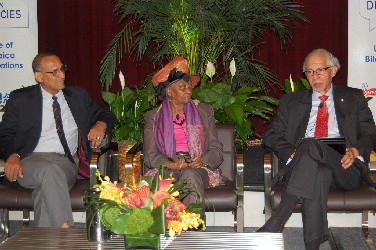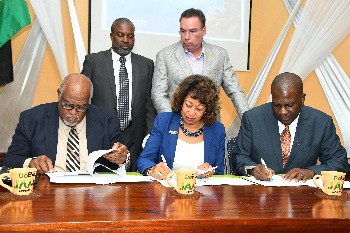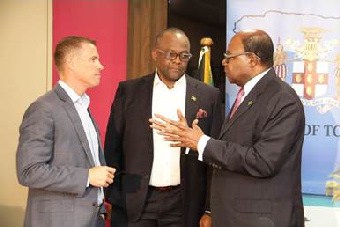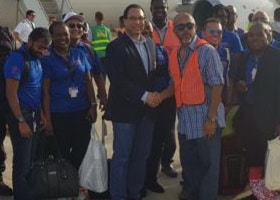Use Jamaicans in the Diaspora to Strengthen US-JA Relations
NEW YORK – “Jamaica needs to look to its Diaspora in the United States in a serious way to use their technical expertise, access to key agencies and Government in the USA, as well as, continue to strengthen bilateral relations and security” says Former Ambassador to the United Nations (Security Council Affairs), Ambassador Curtis Ward.
The former Ambassador was addressing approximately 200 Jamaicans in New York at a forum about Security and Good Governance in Jamaica, led by the Caribbean Policy Research Institute (CaPRI) and the US Embassy in Kingston, with support from Continental Baking Company (CBC) and Jamaica National Building Society (JNBS).
The forum, held at the New York Hilton Midtown in Manhattan late last week, March 26, was the fourth in a five-part series of discussions by CaPRI and the US Embassy under the Dialogue between Democracies: the Future of US-Jamaica Bilateral Relations project, which commenced late last year.
Contextualising his comments within a call for the US to increase resources to the Caribbean Basin Security Initiative (CBSI); and, for Jamaican governments’ to similarly strengthen the lobby for increased funding of the CBSI, the Ambassador argued that Jamaica needs to better engage members of its Diaspora to advocate its concerns.
“Many Jamaicans are familiar with working with the US Government. Former New York City Councilwoman, Una Clarke, can tell you how many times she has been to Capitol Hill in a private capacity And, it far exceeds advocating for Jamaican and Caribbean issues than the advocacy of the Caribbean diplomatic corps in Washington,” he argued. “This is an area where we need to fill that gap.”
The Ambassador posited that the CBSI was framed with the US to assist countries in the Caribbean to build capacity against drug trafficking and related activities; however, he argued that the resources from the US have not been adequate.
“This is due, in part, to the lack of cooperation from the US Congress,” the Ambassador said, although he prefaced his comment with an acknowledgment of US efforts, which have resulted in Jamaica having the strongest maritime security in CARICOM.
The Ambassador said funding for the US Southern Command, which is responsible for securing the US southern border and cooperate with governments in the region in drug interdiction, has been insufficient. He added that Congress had cut in half the original appropriations requested by President Barack Obama to fund the CBSI, although, he opined, the CBSI has been underfunded since inception.
However, he stated that successive Jamaican governments have equally failed to make a strong case for more funding. “As a result, the level has been far less than what is needed to deal adequately with the problem,” adding that there was also need to support Jamaica with gathering and using intelligence effectively.
“The onus is on the Jamaican Government, in collaboration with the US Government, to initiate and develop programmes to satisfy the security needs of the country. In other words, not to wait until programmes are offered which may not be appropriate to the security priorities of the Jamaican Government,” he said.
Against that background he called for Jamaica to make better use its people in the Diaspora to support its causes.
Giving support to Ambassador Ward’s view, the former New York Councilwoman, Dr Una Clarke, called on Jamaicans overseas to strengthen their organisation in the United States, so that they can be better positioned to represent the concerns of Jamaica and the Caribbean.
“We are here in the United States with the same ability and brain power, therefore, if we would cooperate with each other, the way other ethnic communities do; and, especially to vote, so that candidates can understand that our vote could pose a threat to their office; then, we would get what we want for Jamaica and the rest of the Caribbean,” she argued.
She said, however, that there needs to be stronger coordination between Jamaica and Diaspora communities, so that Jamaicans overseas are clear about what the nation’s issues are so that they can be better able to identify how they can advance Jamaica’s interests.
“We need to reconfigure and work with [those positioned in Jamaica] so that there is no lack of information about what the needs are for Jamaica. We have to insist the ways other [ethnic] groups insist, because it is our tax dollars that goes someplace else. We have people in United States of America from the highest high in Government to the lowest low of what immigrants do. And, if we bringput everyone together; to determine what we are going to do, to back up Jamaica…it will get done,” she said.

Photo Credit: Derrick Scott
Earl Jarrett, General Manager of JNBS and Vice Chairman of CaPRI, said he would be willing to lead the establishment of a database of Jamaicans overseas who are willing to serve on public sector boards, which could be shared with government and related agencies to support initiatives to engage Jamaicans in the Diaspora. Mr Jarrett, who is also Chairman of the Jamaican Diaspora Institute, suggested that now is a good time for the Jamaican Government to look at how it can include Jamaicans overseas on local boards of agencies. And, within that context, he called for Jamaicans in New York to make themselves available to serve.
“I know that the question will arise: How do I make myself available? One can initially write in to the Cabinet Secretary and send in your resume,” he proposed. “And, on our part, your response would assist with creating a database of persons who are willing to serve,” he said.
At the same time, urging deeper discussions about direct participation of the members of the Jamaican Diaspora in governance through voting in national elections, Ambassador Ward bemoaned that there is still no way for Jamaicans to directly participate in the governance of the country. “This is a conversation we need to have,” he maintained.
ADVERTISEMENT





